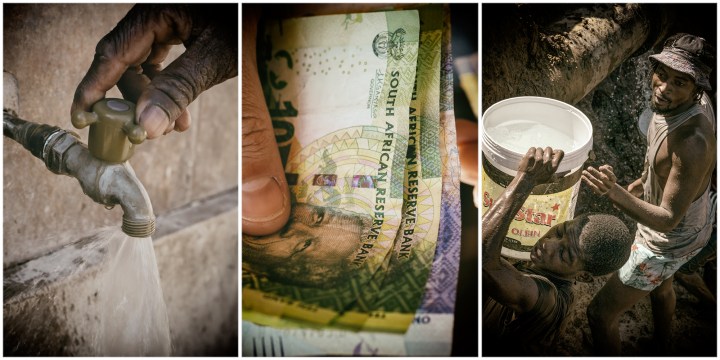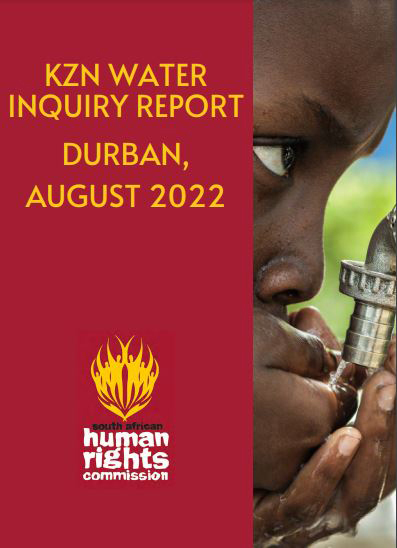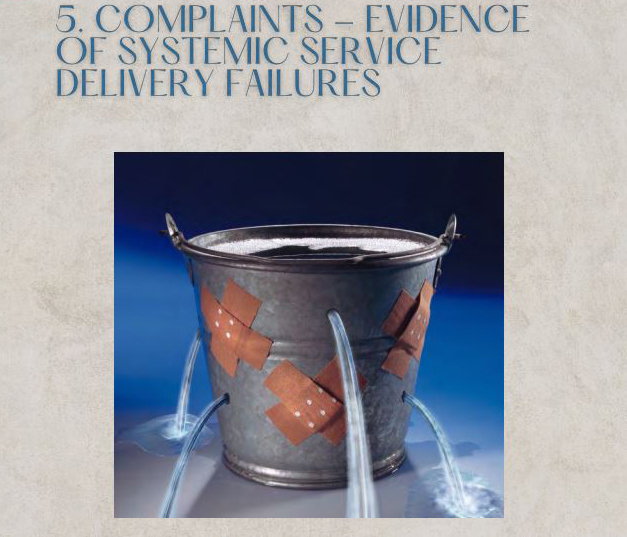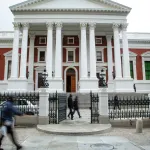WATER CRISIS
Commission warns of water supply ‘disaster’ in KZN unless municipalities tackle maintenance and corruption

The commission’s warning serves as a further wake-up call to municipalities and water utilities over the crumbling state of water supply and reticulation in several parts of the country.
The SA Human Rights Commission fears that a water supply “disaster” is looming in several parts of KwaZulu-Natal unless municipalities are forced to fix and maintain their dilapidated pipelines, pumps and other crucial water supply infrastructure.
The commission’s warning serves as a further wake-up call to municipalities and water utilities over the crumbling state of water supply and reticulation in several parts of the country due to decades of neglect and a widespread failure to set aside sufficient funds to maintain infrastructure and equipment.
In short, there was a price to pay for neglecting to service and repair South Africa’s creaking water supply automobile.
Ultimately, though, these delayed service and emergency repair bills would have to be paid for by taxpayers, ratepayers and businesses – possibly in the form of a new government infrastructure grant, municipal special levies or further water tariff hikes.
‘Pervasive neglect, disregard and contempt’

The commission found that there was a ‘pervasive sense of neglect, disregard and in some instances, contempt, for people’s suffering, and their attempts to engage with their municipality through officials and elected representatives’. (Image: SAHRC report)
The commission’s 155-page report, released in Durban on 18 September, also calls for more urgent efforts to: tackle corruption, illegal water connections, threats from “business forum” construction mafias and the “pervasive sense of neglect, disregard and in some instances, contempt, for people’s suffering and their attempts to engage with their municipality through officials and elected representatives”.
The report follows a five-day inquiry into the water supply crisis, held in KZN last year, as well as scrutiny of more than 600 complaints received by the commission’s provincial office and a review of official submissions by municipalities, water service authorities and government departments.
The inquiry panel – chaired by commissioner Philile Ntuli and supported by commissioner Chris Nissen and University of KwaZulu-Natal water researcher Prof Tafadzwa Mabhaudhi – made several findings and recommendations to patch up the mess and hold municipal officials to account.
“The Commission finds that in respect of the KZN Water Master Plan, municipalities are not adhering to the guidelines to reserve 8% of their annual operational budgets for operations and maintenance – which is causing an imminent disaster in terms of the functionality of the infrastructure.”
The 8% maintenance guideline set by Treasury was nowhere near on track, with some municipalities spending less than 1% on maintenance.
According to the commission panel, KZN municipalities were “on average” budgeting between 2-3% for infrastructure maintenance.
eThekwini budget dwindles
In the case of the largest city in the province, representatives of the eThekwini Metro Council told the commission that some of Durban’s water pipes date back to the 1950s – but the maintenance budget was decreasing steadily, increasingly swallowed up by the cost of supplying water to an influx of rural communities moving closer to the city.
Whereas the city calculated that it should be spending at least R1.6-billion a year on maintenance, only R500-million was being allocated annually at the time of the commission’s hearing last August.
According to the commission’s interpretation of eThekwini’s presentation: “Money is being taken from fee-paying customers in formal settlements, without maintaining these services, to finance non-revenue residents in informal settlements.”
It continued: “The municipality reported that it does not have the budget to address the water infrastructure that has reached its useful limit. It reported that its maintenance budget is shrinking as a result of the need to spend money on services that are not generating income…
“eThekwini has the engineers and experts but needs the finances to affect the infrastructure demand. In this regard, an infrastructure surcharge or levy is going to be introduced, as the funding model is inadequate.”
The city had taken out a further loan of R1.5-billion in 2022, and now had an outstanding loan of R10-billion which needed to be serviced.
Trouble in Ugu
The Ugu municipality on the KZN South Coast was also singled out for its failure to provide reliable water supplies, while still billing residents in full.
The Ugu Ratepayers Association told the panel that residents experienced water outages or shortages for several days at a time – in one case for 34 consecutive days in some areas. Local businesses were also severely affected by the frequent water shortages, particularly those in the tourism industry, a primary source of business for the South Coast.
Municipality to blame for endless water crisis on the KZN South Coast — residents
Street protests had escalated and many residents were reliant on water donations from Gift of the Givers and other civil society groups.
In response to queries from the commission, Ugu municipality representatives noted that water infrastructure in urban areas was ageing while rural residents made up nearly 60% of the population and were mostly serviced by water tankers.
“Ugu is plagued by burst pipes, leaks, low reservoirs, illegal connections and vandalism, pump failures as a result of repair and maintenance challenges, and load shedding. The social unrest resulted in 39 service delivery vehicles being destroyed. In addition, panels and cables have been stripped and stolen.”
The panel had been told that Ugu was only able to budget around 0.9 to 1.1% of its Capex for maintenance, and not 8%, due to funding constraints.
“The panel noted with concern that the majority of the commission’s complaints received come from Ugu, yet the plan presented does not speak to the plight of the people who have complained, and the desperation of the situation in Ugu.
“The panel expressed the view that the Ugu delegation had not conveyed a sense of understanding of this situation. The panel noted that some areas have no water whatsoever, such as shopping malls and old age homes, and that people inland have not had water for years.”
‘Poor planning and resource management’
Overall, despite acknowledging the legacy of apartheid planning and the impact of the April 2022 floods, the commission found there was still no valid excuse for most of these service delivery failures, which rather reflected “poor planning and management of resources, particularly in relation to non-revenue water and maintenance of infrastructure, a reluctance to deal with corruption and non-performance, and an inability to plan and budget for future needs and expenditure”.
“The Commission finds that in KZN, municipalities in general and Water Service Authorities (WSAs) in particular have violated residents’ right to access clean drinking water, as provided for in international, constitutional, and statutory provisions.”
The extent of these challenges was “profound and indicative of systemic failures in water provisioning, and the violation of multiple human rights”.
“The impact on the rights, livelihoods and dignity of communities is particularly aggravated in impoverished communities and vulnerable households. The impact on businesses, and the resulting undermining of employment, livelihoods and local economic development is devastating.
“The Commission finds unacceptable the failure of the state, 28 years post-apartheid, to transform colonial and apartheid-era spatial planning to benefit previously excluded and disadvantaged communities.”
This violation of rights was “indicative of a gross dereliction of duty on the part of municipalities and WSAs to enact reasonable measures to deliver on rights and fulfil their obligations to communities”.
Call for intervention

The commission fears that a water supply ‘disaster’ is looming in several parts of KwaZulu-Natal, unless municipalities are forced to maintain their dilapidated pipelines, pumps and other crucial water supply infrastructure. (Image: SAHRC report)
To help remedy the crisis, the commission has called on the national Department of Water and Sanitation to intervene directly in the worst-performing municipalities by taking over their water services function, in parallel with the Department of Cooperative Governance and Traditional Affairs (Cogta).
Cogta should also review the funding model for municipalities and consider provisioning a special grant to upgrade and rehabilitate critical water infrastructure and report on progress to the commission within 12 months.
In certain cases, Cogta should take measures to declare a “state of disaster” to escalate the immediate restoration of water services and to effect necessary repairs to damaged or neglected infrastructure.
Cogta should also ensure that the KZN Water Master Plan “considers the regression in municipality performance, and identifies radical measures to address this, including fraud and corruption, and intra-political party fighting within the public service”.
It further recommends that Water Boards in KZN should also “prioritise urgent steps to address the ageing infrastructure and maintenance of the respective water boards in order to prevent their functions from collapsing”.
There was a need for water service authorities to review water tariffs as they were “incompatible and unsustainable to provide for both operating and maintenance costs”.
Corruption and sabotage
Corruption and deliberate sabotage of water supply systems by several parties – including municipal staff – should also be addressed urgently.
While recognising that large numbers of people in KwaZulu-Natal were poor, the commission broached the politically thorny issue of compelling people to pay their fair share for water, where they could afford to.
The panel quotes former Cogta MEC Sihle Zikalala as stating that 77% of rural households in KZN are indigent and entitled to free basic water – placing strain on municipalities with low revenue streams.
However, the national Department of Water and Sanitation had noted in its presentation to the panel that non-payment was “exacerbated in instances where people can afford to pay for water but do not” – as rural communities were mostly categorised as indigent and therefore not billed for water services.
This issue was also raised by the eThekwini municipality, whose representatives said they were piloting the use of smart meters to ensure that free water only went to people who really could not afford this service.
Currently, however, eThekwini’s billing system recognised people as “indigent” according to the areas they lived in – and was “unable to distinguish affordability”.
Members of the Amajuba District Municipality had told the panel they were reviewing their indigent register because they were “cognisant of the fact that some community members register their parents for municipal accounts”.
“It noted disparities in the indigent system, stating that in many rural areas, the district municipality notes impressive houses, and is aware that teachers and nurses are living there, as well as local businesses who can afford to pay for the water.”
As a result, the panel has recommended that all district municipalities should revise the indigent register model in rural communities, to ascertain which households were entitled to receive free basic water, while ensuring revenue collection from households that can afford to pay for water services.
- Responding to the commission’s report, the KwaZulu-Natal MEC for Economic Development, Tourism and Environmental Affairs affirmed the province’s support in resolving the water crisis in KZN.
MEC Siboniso Duma said in a statement on 20 September he believed that improved quality of life, economic development and job creation were intrinsically linked to adequate bulk water availability.
“It is for this reason that as elected public representatives (we) have a responsibility to demonstrate accountability and show a sense of urgency in the face of this crisis.”
While pledging to “work with law enforcement agencies to arrest those responsible for the sabotage of water infrastructure with the sole intention of procuring water tankers”, Duma also cited budget cuts, the impact of the 2022 floods and the legacy of apartheid planning among several factors to be considered as contributing to the crisis. DM






















 Become an Insider
Become an Insider
As a professional engineer with ,more than 60 years experience, half in the public sector up to DDG level and half in the private sector my take on the problem is that it is not primarily a financing problem but a lack of competence in government bodies as to how to use the money effectively. The problem is not in the water sector only but pervasive throughout government.
Vote DA everyone if you want any sort of a country to live in.
2024 is literally SA’s last chance.
Now this is what happens where the ANC governs – include the deployed cadres of the HRC. Everything is blamed on apartheid even 30 years later and whole communities are classified as indigent although there are professional people living in these communities. They all get services for free. Now we understand why people who can afford to live in middleclass suburbs prefer to remain in the “spatial planned” areas. Everything is for free there. Then there is no income generated by the municipality, the old infrastructure from apartheid days can not be maintained, just add more taxes to those living in areas where people do pay for services. Then “their people ” remain happy, the ANC mayor can get a salary increase earning more than the President (that is affordable of course – and music concerts sponsored by the municipality). The people are happy only they have no water – but at least they have the ANC. Then DM makes an issue against Swellendam municipality where people insist that there must not be a application for free services or a means test or the “people” will burn everything in their way. If DM will now go to Kwa Zulu Natal to each of these places mentioned in the report and spend time with the community and write articles on what is found , that will be objective journalism. Denise Smit
I live in KZN under Ethekwini. I have woken up, this morning, to my 4th day without water.
We have received little to no information on the reason for the problem other than it has been fixed & are waiting for reservoirs to refill. Makes me wonder if the guys up in Westville refusing to pay their taxes might actually be the way to go?
We are also in Ethekwini, 4th day with no water. The rate payers need to follow in Westville’s steps. These are the affected areas of this outage and these areas account for the majority of Ethekwini’s rates…
Redhill, Durban North, Beachway, Umgeni Park, Athlone, Japanese Gardens, and Riverside, Beachway and Riverside, Glen Anil, UMhlanga CBD, Glen Hill, uMhlanga Rocks Drive, Parts of Umgeni Park, Blackburn Road, Parkhill, and certain roads in Effingham, Sunningdale, La Lucia, La Lucia Mall, Glenashley, Glen Anil, Somerset Park, uMhlanga, and La Lucia Ridge.
You would think the mayor would be involved if he realised that the majority of his rates was at risk.
The people have had enough, the politicians don’t give a damn and yet they are happy to spend millions of our money rewarding themselves.
It’s time the rate payers got together and followed in Westville’s steps.
The problem in UGU, where we have a property, is not a lack of funds, it’s just that the funds are being used to pay whacking great salaries to hugely incompetent people and bugger all is spent on actually fixing the problem!!!
The old Hibiscus municipality was run by about 20 people, the UGU municipality is “run” by about 90 people, you don’t have to be a rocket scientist to see where the problem lies!
I have to say that I thought that the Zulu nation was quite a proud bunch, I really would not have expected them to stuff up this badly and become the laughing stock of SA.
The SA Human Rights Commission is fast asleep, as usual. It must wake up from slumberland and do something about the problem, not simply tell us that which we already know about. It is telling us nothing new. Water is a basic human right and the public are entitled to a regular supply of water. Nowhere in the report does the SAHRC tell us what it plans to do about the problem. It is the job of the SAHRC to force the municipalities to execute this function, professionally. Instead it does absolutely nothing. The SAHRC is simply a toothless bulldog, and a well fed one at that.